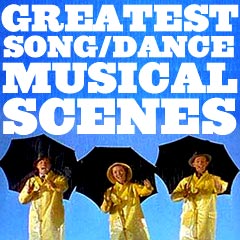
|
|
| P (continued) | ||

|
This masterful Disney animation, Disney's second full-length animated film (following Snow White and the Seven Dwarfs (1937)), was about Geppetto, an old Tuscany wood-carver who wished that his hand-made wooden puppet named Pinocchio would turn into a real boy. Shortly later, a Blue Fairy (voice of Evelyn Venable) promised that if Pinocchio was brave, told the truth, and was unselfish, the wish would come true. The film won two Academy Awards: Best Original Music Score, and Best Original Song. The film was most noted for its award-winning song When You Wish Upon a Star (pictured), sung by small Jiminy Cricket (voice of Cliff Edwards) during the opening credits. There were many other reknowned musical scenes:
|
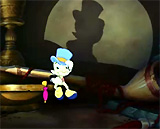  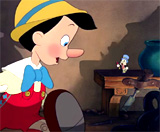 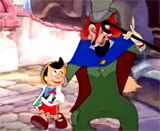 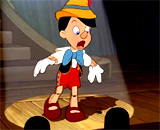
|

|
The Pirate (1948) Director Vincente Minnelli's and MGM's Technicolored musical romance with a Cole Porter score was adapted from S. N. Behrman's 1942 non-musical Broadway play (starring the sophisticated acting team of Alfred Lunt and Lynn Fontanne). The plot was set in 1830s West Indies, in the village of Calvados. It was about notorious 'pirate' or 'sea wolf' Mack the Black (or Macoco) - a strolling, hammy philandering, traveling troubadour-actor named Serafin (Gene Kelly) who was posing as "Mack the Black" (played as swashbuckling Douglas Fairbanks or Errol Flynn with a mustache and black hair). Serafin fooled naive and moony Caribbean girl Manuela Alva (Judy Garland) into falling in love with him (and believing he was the romantic buccaneer) rather than marrying duplicitous, fat mayor Don Pedro (Walter Slezak) - the real Macoco who had become old and obese. It was the only Garland MGM film that lost money, at a time when Garland (married to director Minnelli) was personally struggling with drug addiction. The most noted musical numbers were:
|
 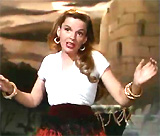 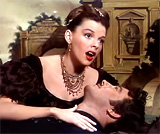 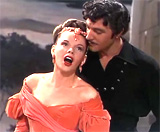 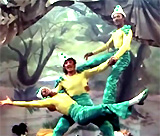 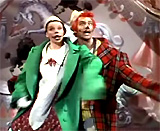
|
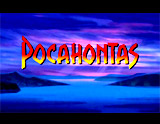
|
Pocahontas (1995)
This under-rated Disney animated feature film was the studio's first to highlight an actual historical figure. It offered up Alan Menken (music) / Stephen Schwartz (lyrics) musical production numbers, and won two Academy Awards for Best Original Song (Colors of the Wind) and Best Original Musical Score (Menken and Schwartz also).
|
 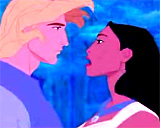 
|
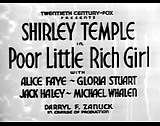
|
Poor Little Rich Girl (1936) Fox Studios capitalized on its greatest moneymaker in the 30s --- young Shirley Temple, and this display piece was no different than many other Temple "moppet" films (with weak plotlines and mostly ridiculous circumstances), highlighted by fantastic dance and singing scenes. This Fox film by director Irving Cummings was loosely based on the 1917 silent feature of the same name (with Mary Pickford), with music and lyrics by Mack Gordon and Harry Revel. Shirley starred as neglected child Barbara Barry of a wealthy, strict and widowed father (a soap-tycoon). When alone and stranded, she became friends with two unemployed vaudeville entertainers: Jimmy Dolan (Jack Haley) (Shirley called him "Pudd'nhead") and his wife Jerry Dolan (Alice Faye), who took her on as their "poor little rich girl" daughter. They were a song-and-dance team known as Dolan and Dolan. As a budding radio star, Shirley had the opportunity to perform in a number of musical scenes:
|
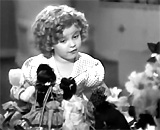 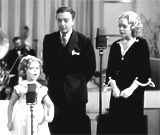 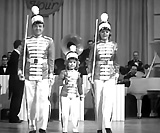
|
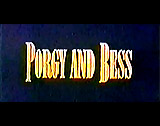
|
Porgy and Bess (1959)
This Gershwin musical (adapted from the 1934 opera) from Columbia Pictures was directed by Otto Preminger. It was produced by independent Hollywood producer Samuel Goldwyn. Copies of the film have been very hard to locate and it has been rarely seen. It was an Academy Award winner (its sole win) for Best Musical Score (Andre Previn and Ken Darby). Its other three nominations were: Best Sound, Best Costume Design, and Best Cinematography. An adaptation of the original 1935 Broadway play, it featured an African-American cast, mostly non-singers who were dubbed by others:
The main numbers were:
|
|
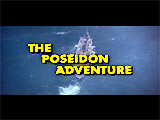
|
The Poseidon Adventure (1972)
The "Master of Disaster" producer Irwin Allen's quintessential, all-star ensemble cast/disaster film epic was about the capsized SS Poseidon on New Year's Eve when a tidal wave (caused by a submarine-induced earthquake) flipped the passenger ship upside down. It was followed by a lesser sequel Beyond The Poseidon Adventure (1979) and a critically-panned remake Poseidon (2006) 34 years later, directed by Wolfgang Petersen. The Ronald Neame-directed film received eight nominations and one win - Best Original Song for The Morning After (aka The Song from The Poseidon Adventure), plus a Special Achievement Award (non-competitive) for Visual Effects! One of its non-winning nominations was for Best Original Music Dramatic Score (by up-and-coming composer John Williams). Although most people recognize the Maureen McGovern version of The Morning After, she did not sing it in the movie (but did release a recording of the song after the film was released). The character of Nonnie Parry (Carol Lynley, dubbed by Renee Armand), performed in an on-stage band during a New Year's party rehearsal session onboard (pictured thrice), and then during the actual party (pictured), sang in the song in the film. |
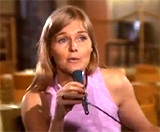 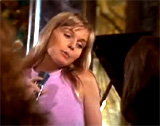 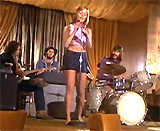 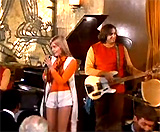
|
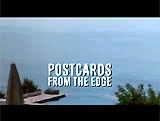
|
Postcards From the Edge (1990) This Mike Nichols' film from Columbia Pictures was an adaptation of actress Carrie Fisher's own 1987 semi-autobiographical novel of the same name, loosely based upon her relationship with her mother Debbie Reynolds (who married Eddie Fisher). Oscar-nominated Meryl Streep starred as cocaine-addicted film actress/daughter Suzanne Vale, whose life was chronicled in postcards, conversations and journal writings. Susanne's heavy-drinking, self-interested star mother, Doris Mann, was portrayed by Shirley MacLaine. There were a few great musical performances:
|
 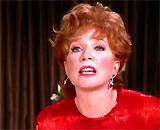 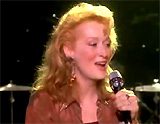
|

|
The Prince of Egypt (1998)
DreamWorks Pictures' dramatic animated recreation of the Biblical epic of Moses (from the Book of Exodus) was the studio's first traditionally animated film. It featured songs written by Stephen Schwartz and a score composed by Hans Zimmer. Its two Academy Award nominations were:
During the film, the song (pictured thrice) was performed by Sally Dworsky (singing voice of Miriam) and Michelle Pfeiffer (as Tzipporah), and a Boys Choir:
Popular single (and album) versions of the winning song were performed by both Whitney Houston and Mariah Carey, heard during the end credits (pictured). |
 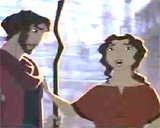 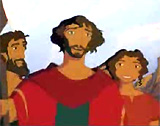 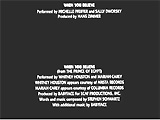
|
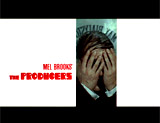
|
Writer/director Mel Brooks' outrageous musical comedy (his debut film) was a zany, often brilliant spoof comedy about Broadway productions and the Nazis. A desperate, bankrupt, wild-eyed, hustling Broadway producer Max Bialystock (Zero Mostel) greedily paired up with his timid and high-strung auditor/accountant Leo Bloom (Gene Wilder in his first starring role). Together, they concocted an illegal 'sure-fire' scheme to make a million dollars from investors by producing the worst, most tasteless play ever made - a perverted musical romp offensively named Springtime For Hitler. Their plan backfired when the flop was actually a surprise hit. The remake The Producers (2005) adapted the award-winning Broadway show musical of 2001 (with 12 Tony Awards, breaking the record held for 37 years by Hello Dolly! which had won 10), starring stage performers Nathan Lane and Matthew Broderick in the roles made famous by Zero Mostel and Gene Wilder. It was highlighted by:
|
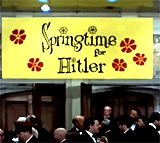 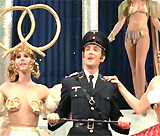 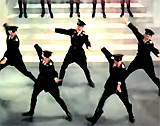 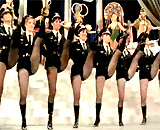 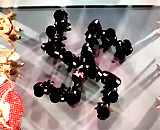 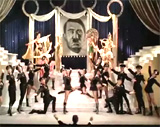
|
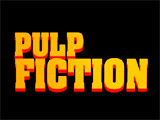
|
Director Quentin Tarantino's Oscar-winning independent film (Best Original Screenplay), his second feature film, was a stylish, immensely-popular, violent, off-beat, modern B-movie cult classic. One of its highlights was:
|
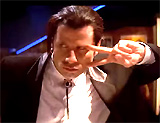 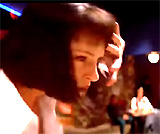 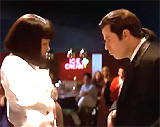
|
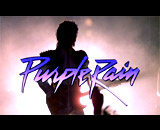
|
Purple Rain (1984) This was an electrifying, highly-profitable semi-autobiographical rock musical drama/concert film. It won the Academy Award for Best Original Song Score (by Prince). It starred pop singer Prince as The Kid (in his acting debut), who performed classic rock songs in the soundtrack (concert-style), such as:
|

|
(alphabetical by film title) Introduction | A-1 | A-2 | B-1 | B-2 | B-3 | C-1 | C-2 | D-1 | D-2 | E | F-1 | F-2 | G-1 | G-2 H-1 | H-2 | I-J | K | L-1 | L-2 | M-1 | M-2 | N-O | P-1 | P-2 | R-1 | R-2 | S-1 | S-2 | S-3 | T | U-V | W | X-Z |